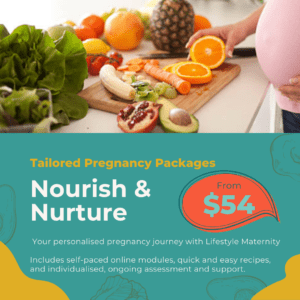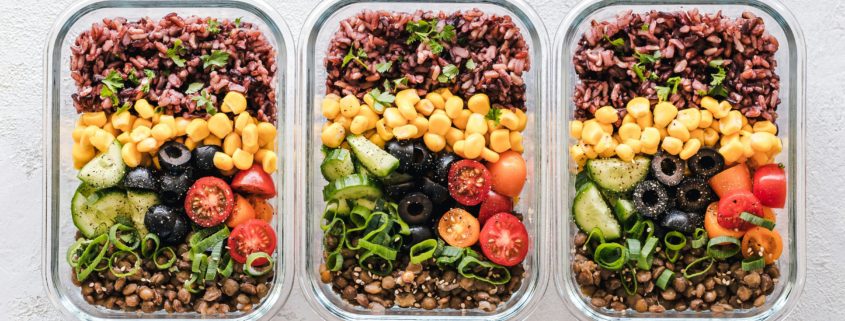Busted! Three Myths About Pregnancy Nutrition (PART 1)
Congratulations! You’re pregnant. It’s a whirlwind of emotions, doctor’s appointments, and a million questions about what to do (and not do) to ensure a healthy pregnancy.
Nutrition is a big one, and with all the information (and sometimes misinformation) floating around, it’s easy to get caught in a web of myths. Let’s debunk three of the most common myths about pregnancy nutrition so you can focus on feeling your best and nourishing your growing baby.
Myth #1: You Have to “Eat for Two”
This age-old adage might sound logical, but it’s a misconception. While your body does need additional nutrients to support your baby’s development, the increase isn’t as dramatic as “eating for two” implies.
In the first trimester your energy (kilojoule) needs are about the same as when you weren’t pregnant.
It’s only when you get into your second and third trimesters that you need more protein and energy—an extra 1400kJ a day (second trimester ~ 300 calories)) and 1900kJ a day (third trimester ~ 450 calories)) is all you need.
Your protein needs are only 60grams per day.
What is this in ‘real food’? An extra serve from the meat and alternatives group and two to three serves from the breads/cereals/grains group.
Focus on Quality Over Quantity:
Instead of simply doubling your portions, prioritise nutrient-dense foods. Think fruits, vegetables, whole grains, lean proteins, and healthy fats. These provide essential vitamins, minerals, and fibre that are crucial for both you and your baby.
Listen to Your Body:
Hunger cues are your best guide during pregnancy. Some days you might feel hungrier than others. Pay attention to your body’s signals and eat until you’re comfortably satisfied, not stuffed.
Myth #2: Certain Cravings Mean Your Body Needs Something Specific
Pregnancy cravings can be intense, from ice cream to pickles (or even a bizarre combination of both!). While some believe cravings are your body’s way of signaling a nutritional need, it’s not always that simple.
Cravings Don’t Always Equal Deficiencies:
Cravings can be influenced by hormones, fatigue, or simply the appeal of a particular flavour or texture. Don’t feel guilty about indulging occasionally, but remember moderation is key. Practicing eating mindfully can help here.
Fuel Your Body With Balanced Choices:
If you’re craving sweets, opt for a piece of fruit with a dollop of yoghurt or a homemade smoothie with fresh berries. Maybe add a shake or two of drinking chocolate on top? If you are craving something salty make some home cooked popcorn and lightly salt or opt for some lightly salted and roasted nuts, like almonds or macadamias. This way, you satisfy your cravings while getting some valuable nutrients in the process.
Myth #3: We shouldn’t talk about weight gain during pregnancy
Weight gain is a natural part of pregnancy, and the amount varies depending on your pre-pregnancy weight and various other factors.
However, there’s a healthy range for weight gain during pregnancy. Using a personalised pregnancy weight tracker can support attainment of this goal. Studies show that when a woman knows how much weight to gain during her pregnancy AND is provided with continual feedback about how she is progressing, she is more likely to gain an appropriate amount of weight.
Rather than a one-size-fits-all approach, this approach tailors a weight gain goal to each and every woman during her pregnancy.
Focus on a Balanced Diet for Optimal Weight Gain:
Eating healthy, nutritious foods during pregnancy is important so you get all of the vitamins, minerals and nutrients that you need to ‘grow your baby’.
Weight gain in pregnancy is a matter of balance. You need to balance the foods you eat with the amount of activity you do, as well ensuring your baby is growing well.
It’s important to eat to appetite, make good food choices and track within the shading of your Personalised Pregnancy weight tracker – don’t focus too much on only one or two of these elements.
Healthy weight gain is about getting the balance right.
Bonus Tip: Stay Hydrated!
Staying hydrated is crucial throughout pregnancy for many reasons, including aiding digestion, regulating body temperature, and delivering nutrients to your baby.
Aim for eight glasses of water per day and adjust based on your activity level and climate.
Remember:
Every pregnancy is unique. What works for one woman might not be the best approach for another. Focus on making healthy choices that nourish your body and your growing baby.
NEED MORE HELP?
We offer individual consultations and self-paced online courses as we know you all have different learning styles and budgets. Attending an individual session OR online course with a Lifestyle Maternity dietitian will allow you to assess your diet against recommended guidelines and identify changes that can be tailored to your lifestyle and dietary preferences.
In our self-paced online course you will be encouraged and guided to assess your own health habits against pregnancy recommendations, participate in activities around setting health goals for optimal nutrition and learn how to adapt your routines with confidence to achieve these goals to make them stick. More information here.
An individual consult involves a more thorough assessment of your dietary and lifestyle patterns with a personalised action plan being developed in collaboration with the dietitian. If you would like further information book an appointment now.
IMAGE CREDIT: Ella Olsen, Unsplash
IMAGE DESCRIPTION: Three identical meal prepped containers with brown rice, colourful vegetables and chickpeas arranged in sections.










 Find us on
Find us on
